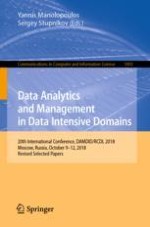2019 | Book
Data Analytics and Management in Data Intensive Domains
20th International Conference, DAMDID/RCDL 2018, Moscow, Russia, October 9–12, 2018, Revised Selected Papers
Editors: Prof. Yannis Manolopoulos, Sergey Stupnikov
Publisher: Springer International Publishing
Book Series : Communications in Computer and Information Science
